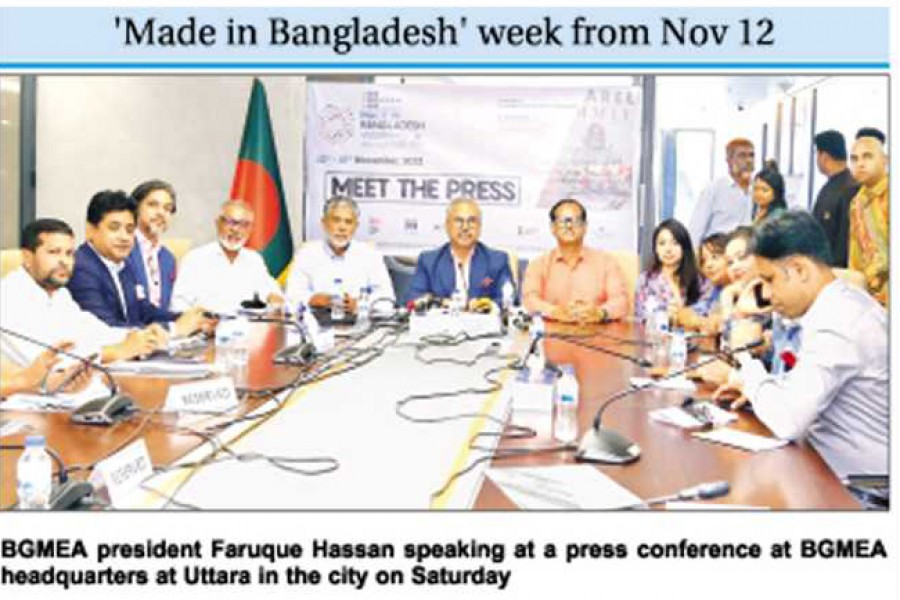Apparel makers on Saturday stressed political stability for sustainable export growth of the ready-made garment (RMG) sector amid a sluggish global demand due to high inflation in major markets.
"We'd be happy if we maintain 15-per cent growth for the RMG sector this fiscal year, although the government targets 10-per cent growth," said Bangladesh Garment Manufacturers and Exporters Association (BGMEA) president Faruque Hassan.
In the first two months of fiscal year 2022-23, the sector witnessed 26-per cent growth, he said, adding that political stability is vital for sustained growth.
"We expect that political stability would be there and none would disturb the businesses ahead of the upcoming national elections," he said in response to a query at a press conference at BGMEA headquarters in Uttara.
The media was convened to announce the details of the 'Made in Bangladesh Week' to be held at Bangabandhu International Conference Centre on November 12.
There would be a number of events, including 37th IAF World Fashion Convention, third Apparel Summit, Dhaka Apparel Exposition, Bangladesh Denim Expo, award-giving ceremonies, launch of BGMEA innovation centre and multiple sessions on sector-related issues.
Addressing the briefing, Mr Hassan also said they want to grab a 10-per cent share of the global apparel market by 2025 focusing on diversification of both products and markets.
At present, being the second-largest apparel exporter, Bangladesh's global market share is 6.8 per cent, he said citing the World Trade Organisation (WTO) which is scheduled to announce the 2021 global apparel market share data at the end of September.
Explaining global factors, Mr Hassan said global apparel demands have been decreasing mainly because of the high inflation and interest rate in major importing countries and energy prices.
"Work orders have already declined by 20-30 per cent in recent months while some buyers have hold or deferred shipments," he said, adding that export growth might be negative in coming months beginning from this month.
They are now focusing more on products and markets diversification, the BGMEA leader said, adding that the mega event is part of their marketing strategy amid sluggish global market demand.
Through the event, the sector wants to rebuild its image through showcasing its capacity, good practices and improved workplace safety and others.
Mr Hassan also urged BGMEA members not to cut apparel prices in negotiation with their respective buyers amid a downtrend in raw material prices, saying apparel prices increased for high prices of raw materials.
He called the government for measures to ease export-import activities, especially making user-friendly customs, ports and bond-related ones, to help reap benefits of the fast fashion opportunities.
The RMG industry is also facing gas and electricity crises, resulting in a rise in costs, Mr Hassan said.
For inadequate electricity, he explained, generators keep running using diesel while on the other hand generators become crippled for long-time operation.
"As a result, production costs are going up two ways," the BGMEA president said, demanding uninterrupted power and gas supply to the industry.
He also demanded a reduction in source tax at 0.50 per cent from existing 1.0 per cent.


